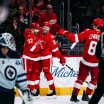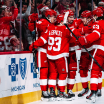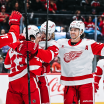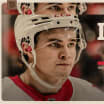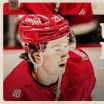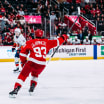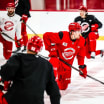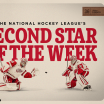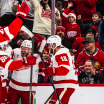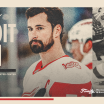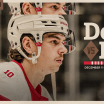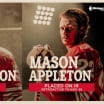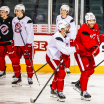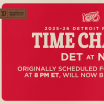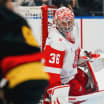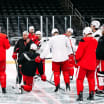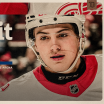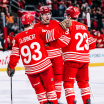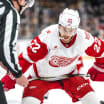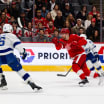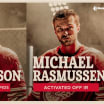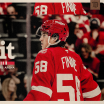When it comes to finding ways to improve a hockey club, NHL general managers will leave no stone unturned.
Every season, each team deploys a staff of scouts to scour hockey rinks across North America and Europe looking for the next piece of the puzzle that will help them win hockey games and, ultimately, championships.
Red Wings scout undrafted free agents in college, juniors and Europe
Team hopes to find players that have developed at other levels, like Hirose and Kuffner
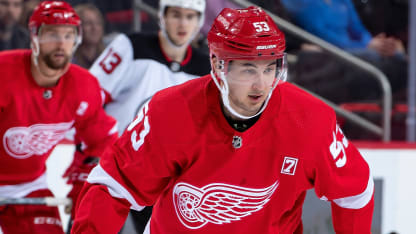
© Dave Reginek/Detroit Red Wings
By
Julie Robenhymer @JulieRobenhymer / Special to DetroitRedWings.com
The Detroit Red Wings and general manager Ken Holland have stepped up their scouting game the past few years as the team had 21 selections the past two NHL Drafts, including three in the first round, and 11 more this June, including the sixth overall pick.
But while most scouts are focused on players eligible for the upcoming draft and sometimes even the one after that, the Red Wings have also turned their scouting focus to the emerging undrafted free agent market, led by Jiri Fischer, director of player evaluation.
"Just because a player wasn't drafted doesn't mean they weren't watched. It just means no one believed in them enough at that time to select them to be a part of their organization," Fischer said. "They were missing something, whether it be skating or skills or size or maybe even their attitude or confidence, and now after a few more years working on their craft, they've shown that they're more of a complete package and deserve an opportunity to be signed to a professional contract.
"It may seem like it, but undrafted free agents don't just come out of nowhere. They might have been flying under the fans' radar, but not ours. We've been watching them for years."
It's an intriguing market because the players are older and more NHL-ready than draft-eligible players, but since they don't have any NHL experience, they they don't come with the big price tags most free agents warrant.
Instead, they will sign a standard entry-level contract -- and the salary restrictions that come with it -- for one or two years.
For the past three seasons, Fischer has been charged with evaluating and recruiting the best undrafted free agents available in the NCAA, Canadian junior leagues and Europe.
On any given weekend, Fischer, who spent the previous 10 years working in player development for the organization, will see three or four games, often in different states and sometimes even different countries, as he and the rest of the scouting staff whittle the list of potential free agents down to the best of the best.
"Going into every season, we have our list of players to watch and we start projecting, based on what we've seen previously, on how the players could perform the upcoming season and the steps forward they could take and gauge our level of interest and how much we want to see them throughout the year and we make a plan," Fischer said. "Every scout has their own process of evaluating and it's very important to have a different set of eyes and different perspectives on a player. Everyone sees the game different and notices different things about each player. It's my job to try to organize everyone's opinions and make a recommendation to our GM."
As the season wears on, some guys fall off the list while some guys move up the list, and each player has to pass a series of tests whether they know they're taking them or not.
The first, and arguably the most important, is the eye test. Is he good enough to be an NHL player? Does he have any skills that separate him from the rest of the pack? Is that skill set something that will not only work, but will flourish within the systems and strategies we are implementing on the ice? Can he help us win?
Those are all questions Fischer asks as he's evaluating a player. If the answers are yes across the board, Fischer and the scouting staff start digging a little deeper to determine a player's potential.
"Once we decide we like a player, we have to determine where each player is in their development," he said. "Does he already have a pro mentality with his practice habits and his eating habits and there's not much room for improvement in that area or is that something we can help him with and therefore his potential for growth is that much more? Can he take another step or is his potential maxed out? It's all part of the projection process and identifying what a player can potentially develop into."
The Red Wings implement an incredibly thorough process to gather as much information about a player as possible to make the most informed decision they can about whether to offer them a contract or not.
"I talk to everyone," Fischer said. "For me, it's very important to know the player's fitness level by talking to the strength coach as well as the head coach to really get to know the character of a player. It's very important to talk to a family member and observe how players interact with them -- and even with fans -- after the game. It's important to know who their best friends are and who might be influencing them good or bad, as well as their off-ice habits, whether that be in school or how their work on their game or even their social life. We gather a lot of information beyond just what a player is able to do on the ice because if we're going to be investing our time, energy and resources into this player, we're going to do our due diligence to make sure it's a worthy investment."
Right off the bat, Fischer said there are three things that will earn players a pretty swift thick black line through their name -- being lazy, being dumb and doing drugs.
"We can weed some guys off the list pretty quickly using these three criteria," he explained. "It's very hard to be a successful pro if you're lazy. It's very hard to be great at the next level when a player doesn't have the on-ice IQ or isn't willing to put in more work into studying the game, and the same goes for any player that starts exploring drugs.
"Those three habits are extremely hard to change and we stay away from any player that has any one of them. We are looking for players that not only have the necessary skill, but who takes care of themselves and are highly intelligent and highly driven. Those are some of the most important qualities that any player can have."
Throughout the season, the scouting department has several in-person meetings and monthly conference calls to discuss the players.
"By the time we've made the decision to offer a player a contract, they've been seen by numerous scouts, myself overseeing the department of free-agent signings and recruitment, our development coaches, our assistant general manager Ryan Martin, and of course our general manager Ken Holland," Fischer said. "Together we have discussions about how this player might fit into what we're trying to accomplish and what they bring to the table and and how they could make us better before Ken ultimately makes the final decision."
Detroit's director of player development Shawn Horcoff joins us to discuss/evaluate several of the #RedWings' top prospects.
— Detroit Red Wings (@DetroitRedWings) April 1, 2019
Listen/subscribe: https://t.co/DQHlIT2m5k pic.twitter.com/xHhwC1X8cW
Once that decision is made, Fischer shifts gears from evaluating a player to recruiting him.
"Any top free agent has more than a few good offers. The best free agents are being recruited by 20-25 organizations," he explained. "I believe it's very important to be honest with players in presenting all aspects of our organization. Making fake promises doesn't go anywhere. If we're asking a player to sign with us, they should know our organization inside and out and get to know the people in our organization from coaches to management and scouts and what we're all about so they can make an educated decision when the time comes to choose a team."
Fischer and Red Wings management do their best to go the extra mile in showing their interest, whether that is stopping by after a game to say hello or inviting them to development camp or reaching out in the summer to see how they're doing or talking to their coaches and agents to make sure everyone is aware of their intentions. In the end, they make their best pitch and then they wait.
Last month, the extra effort paid off as the Red Wings signed two of the hottest commodities on the NCAA free agent market -- Ryan Kuffner out of Princeton and Taro Hirose out of Michigan State -- and Holland credited Fischer as a big reason why they were able to do that.
Big SpongeBob guy. pic.twitter.com/A0JqPtZZrR
— Detroit Red Wings (@DetroitRedWings) March 24, 2019
"Jiri Fischer does a great job of building relationships with the players and the agents and is in constant communication with them and certainly that's how you end up having people that want to join the organization," Holland said.
It was the culmination of more than two years of presenting the opportunity to be a member of the Red Wings to them, and while Holland was excited about the newest weapons in his team's offensive arsenal, he was also excited about what it meant for the future of the franchise.
"If we're going to get competitive, it's got to be done by competing for jobs and pushing people," Holland said. "That's how we built the Red Wings from the early '90s to a few years ago and we're trying to get back to that. So, we're drafting lots of offensive players and we're trying to sign a lot of offensive players. We certainly know we've got to sign some defensemen, but we're hoping the increased internal competition is going to push them and, as a group, we'll be that much better.
"We're going to give opportunities to younger people. But at the same time, they've got to earn it. I'm not giving out jobs. At some point in time, they're going to have an opportunity to get their feet wet, but I do not believe in entitlement. I think it's about accountability, it's about opportunity, it's about educating them to what you're trying to accomplish and hoping they want to be a part of it."
While the Red Wings' season might be over, scouting and recruiting efforts are still underway as potential free agents continue to play this weekend at the Frozen Four and in the playoffs of the CHL and various European leagues.
"Out of our college list, we got our top two guys in Ryan and Taro and we're extremely happy with that," Fischer said. "As far as signing other players this year, that's a better question for Ken Holland, but … we're always looking for players that will help us win games. That's my job. Find the right players. Recruit them and, hopefully, sign them and help them become NHL players who help our team be better and win championships."

